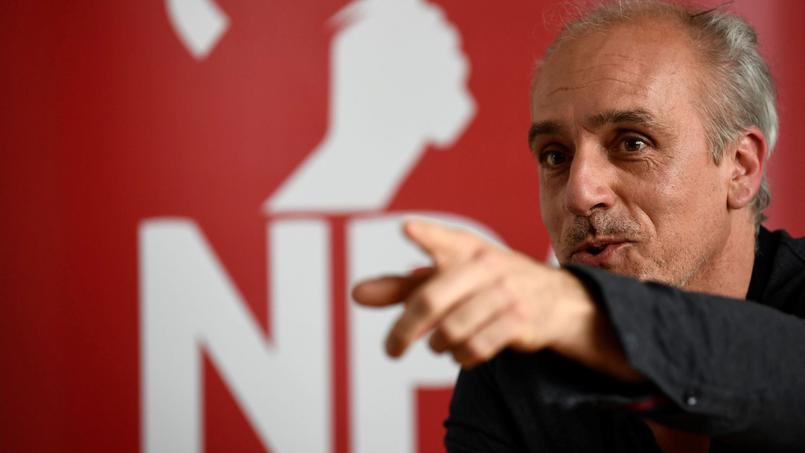Image from Lefigaro
Left Voice’s second issue, “Women on the Front Lines”, is now available for purchase. For every magazine sold, we are donating $1 to a worker controlled factory in Argentina.
“Since we were kids, they told us that this is the way the world is and there’s nothing we can do about it. Since we were kids, they told us that if we can’t get by, it’s our own fault. But you and I know full well that there’s something that’s not right . . .” In Philippe Poutou’s first official campaign video, the French presidential candidate for the New Anti-capitalist Party (NPA) presents himself as an anti-capitalist worker and invites, or rather urges, the viewer to look beyond the normalized relations of capitalist exploitation and imagine the possibility of a radically different society. Until not long ago, Poutou’s candidacy itself seemed an unlikely feat. In order to participate in these elections, the NPA, a small and relatively new party, had to overcome a series of anti-democratic hurdles, including the requirement of obtaining the signatures of 500 elected officials willing to support the candidate’s electoral bid.
Poutou has since been catapulted to national and even international recognition after his performance in the presidential debate held last April 4, in which he denounced, before 6 million viewers, the hypocrisy and corruption of the French ruling class, and in particular, the candidates of of the right-wing party The Republicans (François Fillon) and the far-right, xenophobic National Front (Marine Le Pen).
The recently exposed cases of corruption are just the tip of the iceberg of a profound crisis in France’s Fifth Republic that has seen its traditional right-wing party plummet in the polls and its left wing, the Socialist Party, effectively come undone after the widely unpopular 5-year government of President François Hollande. Many of the Socialist Party’s establishment figures have even refused to back the party’s official candidate and instead have lent their support to Emmanuel Macron, a relative outsider who only recently founded his party En Marche!, which he claims is neither a left-wing nor a right-wing organization, and who now appears in second place in the polls, behind the National Front.
In the context of the virtual collapse of France’s traditional political establishment, one of the many unexpected turn of events in this campaign season has been the significant surge in the polls of Jean-Luc Mélenchon, a member of the European Parliament who broke with the Socialist Party after four decades in 2008 and founded his movement “France Unbowed” in 2017, garnering the support of many of those disaffected with the Socialists.
Mélenchon proposes a “citizen’s revolution” to reform the constitution and implement a series of measures, including the repeal of the widely loathed Labor Reform law that was ultimately passed after months of protests in 2016, the creation of over 3 million jobs, the establishment of a 32-hour work week, the country’s withdrawal from NATO, and large-scale investments to improve public services. In relation to the European Union, it proposes the renegotiation of the terms of European treaties and even the possibility of a unilateral exit, should these negotiations fail.
Mélenchon has drawn enormous crowds and his recent rise in the polls has put the French and international economic establishment in panic mode, with some mainstream media outlets comparing him to Robespierre and Lenin. The right-wing French publication Le Figaro printed an entire dossier on the political leader, describing his program as “a devastating project for France” and including an editorial titled “Maximilien Ilitch Mélenchon.”
International publications such as the Financial Times have warned that the markets have become jittery over the possibility of Mélenchon facing off with Le Pen in the runoff, scheduled for May 7.
How well-founded are these fears for the future of French capitalism in the event of a Mélenchon victory in May? A closer look at France Unbowed’s economic program reveals that Mélenchon has more in common with Keynes than with Marx. Against the political establishment’s neoliberal policies, Mélenchon proposes an economic stimulus project that would involve 100 billion Euros in investments financed by the European Central Bank, in addition to 173 billion Euros to be added to public spending. The plan also relies on a projected rise in state revenue of over 190 billion Euros in five years, linked to a significant drop in unemployment, which would be reduced to half its current rate, and an increase in the inflation rate from its current level of practically zero to over 4% by the end of the 5-year term. This massive public spending would launch a “virtuous cycle,” in which the economic activity generated would lead to an increase in public revenue.
However, Mélenchon has not explained the effect that the projected rise in inflation, aimed at reducing the country’s debt, would have on salaries. Although France’s inflation-indexed minimum wage would rise to 1326 net Euros, most of the population’s salaries are not tied to the inflation rate and would eventually be eroded. An effective defense of workers’ salaries would require the implementation of a sliding salary scale. More importantly, it is not clear how an increase in salaries or a dramatic drop in unemployment could occur without the establishment of a more favorable balance of forces for workers in France against the country’s capitalist class. Recent struggles in strategic sectors of France’s economy, such as Total’s oil refineries or the state-owned railway company have shown that the only way to establish this favorable balance of forces is through mass mobilization and steadfast resistance.
But Mélenchon has reassured the ruling classes that he does not view the capitalist class as an adversary, but rather as a partner, with whom to negotiate better conditions within the limits of a republican system of government. “In any situation,” he says, “there are at least 3 partners: the boss, the workers and employees on all levels.” He thus proposes a reduction in France’s tax on corporations, from 33% to 25% and the application of a tax on financial income to discipline those sectors making what he refers to as “immoral” profits. Mélenchon does not, therefore, see an inherent problem with the economic system that condemns an increasing proportion of the population to unemployment and precarious work conditions, but rather sees the issue in terms of morality, largely as the result of the unscrupulous actions of individuals in certain areas of the economy, such as the banking and financial sectors, which he plans to discipline through the electoral system and the law.
“The only thing that protects everyone is the law, he says. “The law, the rules, that establish work durations,” a statement belied on a daily basis by the conditions faced by workers in their workplaces, the illegal layoffs and the trampling of workers’ and union rights. From Mélenchon’s perspective, the law appears to be an end in itself, but although the law may offer certain protections, the capitalist class has shown time after time its ability to find ways around it in the absence of organized resistance.
In the past few days, Mélenchon has set out to reassure the ruling classes that he poses no threat to the capitalist system. In a recent interview with Le Parisien, he explained “There are some countries that characterize me as part of the extreme left. So where would poor Poutou be in that case? There is a far left in France. It has its own logic, its own program. I’m not a man of the far left.” The head economist of Mélenchon’s movement has even pointed out that “Today, the IMF, the OECD and the European Commission support France Unbowed’s program.” Mélenchon’s team thus celebrates the fact that their program is in line with the current recommendations of the international economic organizations that manage neoliberal policies throughout the world in conjunction with national states.
In contrast to Mélenchon’s proposed policy of establishing a 5% cap on precarious jobs in large corporations and a 10% cap in SMEs and a minimum unemployment rate, the campaign of Philippe Poutou proposes the complete elimination of unemployment and precarious work conditions through the distribution of work hours and the reduction of the workweek. And against Mélenchon’s patriotism and “solidarity protectionism,” which has led him to play to nativist sentiment by saying, for example, that workers sent to France from low-wage EU countries “took the bread out of the mouths of French workers, “ the NPA proposes true workers’ internationalism. In Poutou’s words: “The only borders that should be set up are those between the exploiters and the exploited (…) We must fight against all those protectionist preconceptions (…) rejecting all expressions of racism, xenophobia and the anti-immigrant rhetoric that are present in most discourses (and policies) of the French candidates.”
The NPA proposes a program for the workers and by the workers that can only be guaranteed through mass grassroots organization, to find real and lasting solutions to the problems faced by the working class. His campaign has inspired hope among a significant sector of France’s exploited and oppressed. For this reason, we in Left Voice support his program.











